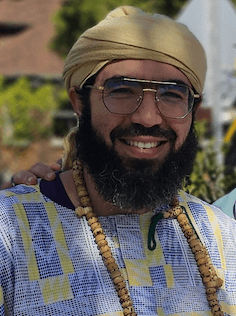THEODICY
A Reflection on the Apparent Contradictions Between Free Will (ikhtiyār) and Predestination (tasyīr)
The Necessity of Atheism and Disbelief for Completing the Manifest Image of Faith and the Emergence of the Illusory World
Abū Hurayra reported that the Messenger of Allah, peace and blessings be upon him, said: "Any matter of significance that is not begun with the remembrance of Allah is cut off—barren (or devoid of blessing)."
This hadith signifies that any matter where the one endowed with choice (mukhayyir) does not begin with the invocation of Allah's name is severed and bereft. The term abtar (cut off) refers to something that has lost blessing and support, falling outside the sphere of divine mercy. Whoever does not begin their actions with the divine name removes themselves from the extended rope of causes that Allah has linked to His servants, severing that connection entirely.
There is no clearer state of severance than atheism itself. The atheist deliberately chooses severance (batr) over connection (waṣl), denying the divine name and, by extension, the essence it signifies. Thus, they exist in the realm of non-being, vanishing into severance and non-existence by cutting off all paths to the divine name, attributes, and essence. If the believer begins every action with the invocation of Allah’s name, affirming existence, then the atheist negates this invocation, affirming non-existence and solidifying severance and non-being. In doing so, the atheist removes themselves from the circle of existence and enters the realm of darkness, divine curse, and misfortune.
Atheism, therefore, stands as the antithesis of belief (īmān). Through atheism, faith gains meaning, depth, rank, boundary, and manifest distinction. As our Sufi masters have said: “Things are known through their opposites.” Īmān forms the luminous stations of return toward the ultimate higher truth, both within the microcosm of the self and the veiled macrocosm of existence. Indeed, most, if not all, traditional Muslim exegetes, whether Sufi or otherwise, agree that the fourfold exemplification of divine light represents the light synonymous with the light of īmān that Allah places in the heart of the believer. This exemplification is the very light by which the believer, after witnessing it, progresses toward higher stations of truth—returning to true Being, ascending closer and closer to the absolute luminous essence of Allah, the One solely deserving of the term Existence. Thus, ontologically and cosmologically, the veiled realm of exemplifications—or the unseen realm—is a realm of light and therefore a realm of īmān.
Atheism, in contrast, serves as the foundational stone upon which the lower realm (dunyā) was manifested. This world is inherently adnā (base or lowest), or, as the Qur'an describes it, aradhāl (most despicable). It is cursed only because of disbelief and atheism, and its illusory, dark nature becomes evident through them. The Prophet Muhammad, peace and blessings be upon him, said: "The world is cursed, and everything in it is cursed except for three: a knower, a seeker of knowledge, and the remembrance of Allah."
Praise be to Allah, who granted believers the key to navigate the trials of this cursed world through His remembrance, transforming their state from one of curse and severance to one of mercy, blessing, and connection.
Disbelief and atheism, as mentioned, serve as the foundational stones for the manifestation of this lowest realm—dunyā. They are the chains that forged the adornments, appearances, and fleeting pleasures, binding the human essence and spirit, which is tasked with breaking free. The Hereafter, by contrast, is the abode of faith (īmān) and submission, where disbelief has no place. In that realm, all dwell in certainty (yaqīn), whether in the eternal bliss of paradise or the torment of hellfire.
This brief introduction clarifies why atheism (ilḥād) and disbelief (kufr) were created and their role in affirming faith and its conditions, as well as in manifesting the lowest and most despicable of things—namely, this world.
Free Will (ikhtiyār) and Predestination (tasyīr) Between the Perception of Atheists and the Reality of the Divine
One of the strongest arguments atheists employ to deny the existence of Allah is the apparent contradiction between the freedom Allah grants His servants to choose between good and evil (Islam or its opposite) and, simultaneously, His predestination of their states. They argue:
“How can a God predestine one to hellfire, compel them to commit deeds deserving of such a fate, and then prohibit them from those same deeds in His law? How can He create a person and their actions, whether lawful or unlawful, and then hold them accountable?”
On the surface, this appears contradictory. Yet, inwardly, it is divinely complete, exalted, and transcendent beyond human beastly comprehension. The apparent contradiction lies solely in the atheist's mind.
Allah created us and our actions. He directs us to our ultimate fate, whether bliss or torment. To claim that Allah cannot create us and our deeds is to deny His divine sovereignty over all things. Such a claim reduces the divine to imperfection—a notion steeped in absurdity.
From another perspective, Allah instilled within us a natural disposition (fiṭra) that includes the capacity for choice. We walk the path of causes through a will that appears, on the surface, to arise from our hearts. This intersection of divine determination (tasyīr) and human volition (ikhtiyār) constitutes the essence of God’s transcendence, a matter far beyond the grasp of finite human intellect.
Simultaneously, Allah knows all of our states, creates our deeds, and grants us the ability to choose. To claim that Allah cannot grant His servants the capacity to choose is to fall into disbelief (ilḥād) as well by subordinating divine transcendence to a limited human understanding.
The key to understanding this matter is to realize that Allah, in His transcendence, unites opposites simultaneously: He predestines us (sayyaranā) and grants us free will (khayyarnā) at once. This divine paradox confounds and incapacitates human understanding, affirming Allah’s boundless power over all things. It underscores the distinction between Lordship (rubūbiyya) and servitude (ʿubūdiyya). Such a profound reality is unveiled only to the knowers of God, those who have been granted access to the innermost secret of the divine presence.
The atheist, however, approaches this matter with their limited, beastly intellect, equating the divine intellect and will with their own. Yet Allah is far beyond intellect and restriction. He is the One who astonishes His creation by creating and encompassing opposites simultaneously, thereby transcending the limitations of direction, interpretation, and negation.
Creation, in its imperfection, cannot comprehend or, more precisely, unite opposites due to its finite beastly nature. The atheist, however, unknowingly projects this imperfection onto the Creator, concluding that Allah cannot encompass opposites simply because the created cannot do so. This contradiction exists solely within the confines of the limited human intellect and holds no ultimate ontological certainty. It leads the atheist to arrogance, reducing existence to what is immediate and perceptible through their fleeting, constrained senses and limited reasoning. Rather than submitting and acknowledging that something greater than their intellect might exist, they fall into self-glorification and self-deification. This hubris ultimately drags them into darkness, severance, and misfortune in both this life and the Hereafter.
The atheist's conception of deity is, therefore, a deficient and flawed god. Persisting in such a belief leaves them, as described in the Qur'an: "Like one in utter darkness, not able to emerge from it." (Qur'an 6:122)
This applies equally to anyone who rejects the divine light (nūr Allāh), refusing to recognize the balance of divine transcendence (tanzīh) and comparability (tashbīh). Instead, they cling to conjecture, preference, and personal interpretation, abandoning certainty and illumination. Allah says: "Is the one who was dead, and We gave them life and a light by which they walk through the people, like the one who is in darkness, never to emerge from it?" (Qur'an 6:122)
Atheism, when viewed through the lens of divine wisdom, is therefore not merely a rejection but a mirror—a necessary foil that reflects the grandeur of faith. Just as darkness defines the brilliance of light, disbelief, which is itself the true darkness, unveils the contours of belief, which is divine light, sharpening its clarity and enhancing its beauty. The atheist and the disbelievers, in severing themselves from the divine, paradoxically affirm its necessity, for even their rebellion serves as a testament to Allah’s encompassing reality. This interplay between faith and disbelief is not a contradiction but a revelation of the divine paradox: the simultaneous unfolding of opposites within a single truth. To embrace this reality is to step beyond the confines of the intellect, surrendering to the mystery of Allah’s transcendence and immanence. Faith, then, is not the certainty of the known in a purely conceptual sense but the trust in the greater unknowable—at least in its initial stages. It is this light that leads us through the shadows of reason and the darknesses of transgression into the boundless expanse of divine unity. Let the believer take solace in this: the tension between choice and predestination, between belief and denial, serves as a signpost on the journey to the One who transcends all dualities, the One in whom all opposites converge.
Publication Date
November 16, 2024
Translators:
Marouen Jedoui


